お問い合わせ先
Research Cooperation Division I,
International Program Department,
Japan Society for the Promotion of Science (JSPS)
5-3-1 Kojimachi, Chiyoda-ku, Tokyo 102-0083, JAPAN
TEL
+81-3-3263-1944
TEL
fos*jsps.go.jp
Note: Please replace*with @.

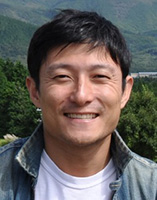 |
Hiroshi Tanimoto Past participation in the FoS program |
|---|
Potsdam again
Now, I’m writing this essay on my return flight from Paris. Earlier, I left Potsdam where I had attended the Scientific Steering Committee (SSC) meeting for the International Global Atmospheric Chemistry (IGAC) Project on which I currently serve. Potsdam is the place of my second and the last visits over the four years from 2009 to 2012 (see 2011 JGFoS Symposium Report for more detail) of my ‘FoS life’. In fact, Greece and Potsdam were the venue candidates for this year’s SSC meeting. Although I voted for Greece since I had already visited Potsdam twice, Potsdam won by a narrow margin at the final vote. I was a bit disappointed and talked with the SSC colleagues, “If only the venue was in Greece・・・” . Coincidentally, however, during this visit, we had dinner at the restaurant next to the hotel where I had stayed at those ‘FoS’ times. As I am easily moved to tears, tears again welled up in my eyes when I walked down a memorable shopping street and saw the hotel bar where we had a get-together-drink after the symposium since many things recalled in my mind.
In scientists’ interviews, we usually hear that they are saying, “I am very much fond of XX since my childhood”, “I always received good marks in science at school” or “I always wanted to be a scientist”. In contrast, I had no particular natural phenomenon in which I was absorbed during my childhood. Even after I became a university student in the Department of Chemistry at Faculty of Science, any inner thoughts to urge me to become a scientist never came to my mind. I went on to the graduate school because most of my friends continued studying in a master’s degree program. Luckily, my research resulted in success in the final year of my master’s course that led me to pursue a doctral course. I earned a doctorate along with the original paper being published. It has been 15 years since then that I became a researcher at a national research institution. After all, I believe a life as a scientist is not so bad.
My FoS Symposium memory
No, I would say it is rather an interesting life as a scientist. Why is it? ... I think the real pleasure of being a scientist is ‘meeting with people’, or, more accurately, ‘an encounter with a personality’. So, it might be better to say that it is a privilege rather than a pleasure. Moreover, the FoS Symposium, especially JGFoS is like a treasure trove which is filled with ‘pleasant encounters’. Actually, I am now puzzled by the message from the FoS alumni which says they are planning a reunion in Kyoto to ‘storm’ into the 2015 JGFoS Symposium venue. Coincidentally, the day of reunion is held clashes with my child’s birthday that comes immediately after I am back home. You may ask what I am bothered about. I am bothered by the idea that somehow I could postpone my child’s birthday party. In this manner, I believe many alumni, in particular JGFoS alumni, keep a similar degree of attachment to the FoS Symposium and hold it dear.
Regarding the event to be reminded when I look back the FoS Symposia, I suppose it took place on the first night in Potsdam. It is a usual practice in a JGFoS Symposium that a preliminary meeting is held between the Japanese side PGMs ahead of an on-the-spot PGM meeting to select the next symposium topics upon the conclusion of a symposium. It happened when the dinner was almost finished and the Japanese PGMs gathered to start discussion. One of the members spoke out and said, “Is this symposium worth doing using tax-payers’ money? Besides, we had to toil by traveling far to come to Germany.” So upsetting! Being an incoming PGM Co-chair, I turned pale but did maintain order to finish the meeting. Despite that, once this outspoken PGM was convinced the worth of FoS, he worked brilliantly and meticulously planned his session that could attract the audience. This episode might be one of several shared amusingly by the alumni. But I also have to say that I recognized him of a genuine scientist spirit through his pointed question. Thus he is one of these FoS symposium participants who have very distinctive character.
As for a number of questions asked throughout the FoS Symposia, the question that remains most impressive was: “What’s new?” This enquiry is still in my mind. Remarkably, this courageous researcher straightforwardly put a question about the substance and the reason of the ‘cutting edge’ to a first-class investigator. It is exactly a kind of a quote that leads us to recognize again the significance of having a wide view. It also reminds us of the importance of taking on challenges that exist beyond the comfort zone of the specialized field.
They are not just the group of individuals with outstanding characters. Many of them are people of human touch. When I served as a PGM Co-chair in 2011, Dr. Atsushi Wakamiya claimed the ‘Team Tanimoto’ to create the lively atmosphere in the FoS Symposium. Dr. Yuriko Yamanaka called me ‘Mr. JGFoS’. Further, Dr. Shinsaku Hiura always concluded his passionate talks by saying, “I’m not sure, though.” This is again one of the ‘FoS witty remarks’. There are many others, although I do not name all of them here, who are really hard-working, forward-looking and very eloquent. Finally, to tell you the truth, every member of the JSPS FoS Advisory Board has quite unique personality.
How about you? Do you think the FoS Symposium is sufficiently interesting for you to apply and attend? If not, I would like to tell you that experiencing the FoS Symposium has a certain significance for being a scientist. As I wrote above about the SSC for the IGAC Project for reference, the activities undertaken in the FoS symposia actually overlap the approaches applied in international research promotion activities. The field of science, particularly in the area where the research is promoted under international cooperation, is steered by employing these approaches. On the other hand, this type of strategy is not quite commonly adopted in Japan. It is not unprofitable, therefore, to get a glimpse of science-steering which is performed in the global standard in a pragmatic sense through the participation in the FoS Symposia.
What is fostering?
Although it might be a sidetracked thing to say, I read the newspaper article on the world university rankings in the cabin. The University of Tokyo was ranked 43rd fallen from the last year's 23rd. Overtaken by the National University of Singapore and Peking University, it is no longer called the top leader in Asia. You may say it is merely a ranking; however, the ranking eventually matters in either respect. As it is often said, “Achievement” = “Ability × Time × Efficiency + Luck.” At the same time, I think science and research could never be an inorganic practice. In fact, it is a very humane activity. The success might often be a product of chance that also includes the element such as the encounter between people. In my view, the FoS program has been implemented in order to raise this chance of probability (in other words, luck).
Japan in the next decades should not simply remain as a science and technology powerhouse as it is now. It is no doubt whether Japan becomes the place where: the value of carrying out a scientific research of non-immediate use in a long term and sustained basis is rightly recognized and; many globally-competent scientists are fostered in future will largely due to the continual implementation of the type of projects exemplified by the FoS program. ‘Foster’, in this essay’s title, means ‘bring up’ and ‘nurture’. The same word is used by IGAC when it describes one of its missions: forming atmospheric science researchers’ communities. In truth, a lot of FoS alumni have advanced their careers by taking advantage of the FoS Symposia experience with the spirit they had captured from it. Moreover, FoS plays an important role to build scientist communities in Japan. I hope the fruit of the FoS program will widely spread for years to come.
Become a PGM if you attend!
To young researchers who are to become a new FoS generation, I would like to encourage you to apply voluntarily, participate in and experience the FoS program to gain the keen sensitivity that I mentioned above. Also, I recommend you to accept the role of PGM if you are given such opportunity. I guarantee it will be truly enjoyable. And ... I’ll see you at a JGFoS Symposium alumni meeting!
The FoS program gave me one of the great nourishment to my scientific life. Again, a life as a scientist is not bad.
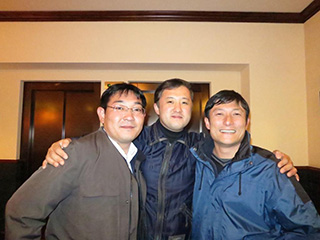 |
|
【9th JGFoS : Graduation from PGM】 |
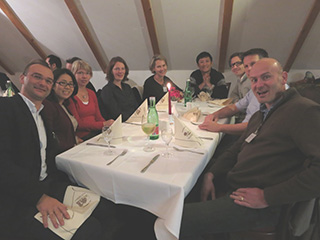 |
|
【9th JGFoS: the last dinner in Potsdam.】 |
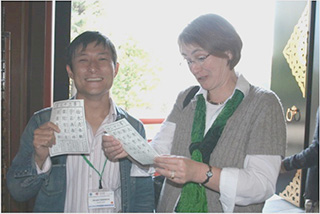 |
|
【8th JGFoS: Cultural Tour to Asakusa】 |
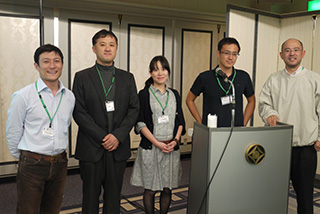 |
|
【8th JGFoS:PGMs】 |
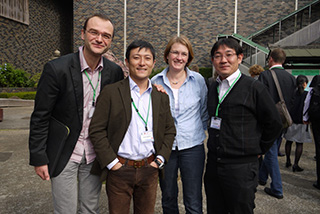 |
|
【The 8th JGFoS: the change of PGM Co-chairs from 2011 team to 2012 team】 |
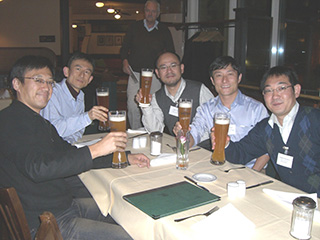 |
|
【7th JGFoS: After the symposium in Potsdam】 |